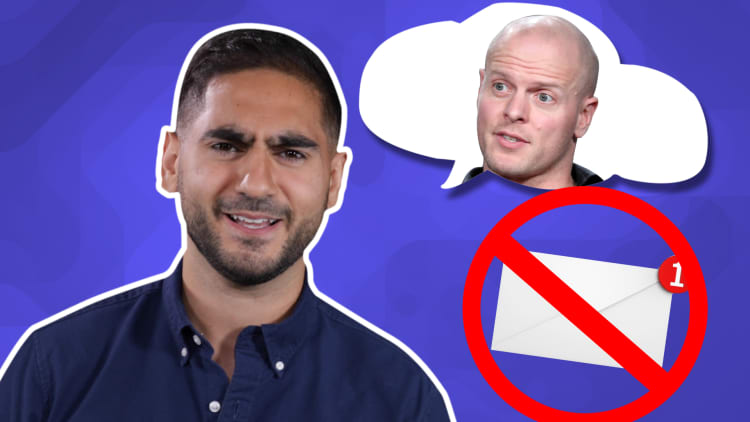Like you, Jake Knapp and John Zeratsky were once obsessed with inbox zero. These former Googlers — who now call themselves "recovering email addicts" — once saw deleting email as the "hallmark of productivity." Knapp, at one point, even developed an email management class at Google to train hundreds of his coworkers on the "virtues of an empty inbox."
Eventually the two technologists came to a difficult realization: getting to inbox zero was actually getting in the way of their real priorities.
"We were supposed to be clearing it out of the way so that we could do our work, but instead, on most days, email was the work. It was a vicious cycle: The faster we replied, the more replies we got back and the more we strengthened the expectation of immediate responses," Knapp and Zeratsky write in their newly released book, "Make Time: How to Focus on What Matters Every Day."
It's a widespread problem. Studies show Millennials and Gen Z are obsessed with reaching inbox zero, a habit that takes hours and hours each day.
Knapp and Zeratsky — who spent years designing some of today's most "addictive tech services," including Gmail and YouTube — realized they had become victims of their own products and routines.

The two began experimenting with their own habits to optimize their energy and focus. They made small changes in their day to win back time in their schedules. This process helped them devise a better framework for a range of daily activities, including managing an email inbox.
These Google veterans suggest these seven tips to keep you from getting trapped in your inbox. Their quick fixes can help you take control of your day and focus on true priorities.
1. Wait until you're tired
Unless your job demands otherwise, Knapp and Zeratsky recommend dealing with email at the end of the day.
"You'll probably have a little less energy at the end of the day, but that is actually a good thing when it comes to email," the authors note. "You'll be less tempted to overcommit by saying 'yes' to every incoming request and less likely to bang out a multipage manifesto when a simple reply would do."
2. Add 'email time' to your calendar
Richard Branson schedules time on his calendar to "dream." LinkedIn CEO Jeff Weiner schedules time to "just think." Knapp and Zeratsky recommend that you slot time on your schedule just for checking and writing emails.
With this strategy, you won't burn time checking email constantly throughout the day. Instead, you'll establish an end-of-day email routine, helping you focus and be more productive.
The tactic might even reduce your stress. Research out of the University of British Columbia found that people felt less stressed when they checked their emails three times times a day instead of constantly responding to messages as they came in. As a result, people also responded to the same amount of emails 20 percent faster.
3. Don't quit on inbox zero
Getting to inbox zero daily is only a good technique if you're just receiving several emails a day, the authors note. Otherwise, strive to empty your inbox out once a week.
"We like the clarity of an empty inbox, but we don't like the daily time commitment," Knapp and Zeratsky write.
"You can still skim your inbox for messages that really require a faster response, but respond to only those," they continue.
4. Pretend your emails are like snail mail
"A lot of email stress comes from thinking you need to constantly check and immediately respond to every new message," the "Make Time" authors point out.
They say that you're better off treating email like an old-fashioned paper letter sent in the mail because unlike the ever-filling inbox, mail only gets sent once a day.
"Most letters sit on your desk for a while before you do anything about them," they note. "Try slowing down and seeing your email as what it really is: just a fancy, dressed-up, high-tech version of regular old mail."
5. Change your mindset — and theirs
Knapp and Zeratsky suggest you be more selfish with your time, especially when it comes to email.
They write, "taking control of your inbox requires a mental shift." While you might think you need to reply to emails immediately, you should try responding as slowly as you can get away with, be it hours, days or even weeks.
"Online, anyone can contact you, not just the highly relevant people in your physical vicinity," they say. "They have questions about their priorities — not yours — when it's convenient for them — not you."
If something is truly important, let people know to call or text. Otherwise, it's likely your coworkers aren't emailing about anything truly urgent and there's no reason to treat those emails like they are emergencies.
Eventually, this practice will reset expectations for the people sending you emails. People will slowly learn to wait for you to respond or get in touch in a more appropriate way.
6. Respect your time off
Regardless of where you go on vacation and whether you've got Internet access or not, Knapp and Zeratsky suggest you act as if you're off the grid.
"It can be hard, because most workplaces have an implicit (and crazy) expectation that you'll check email during your time off," the authors say. "But even if it's hard, it is usually possible."
It doesn't hurt to ask yourself if checking your email is necessary, though. According to one recent survey, some workers check their email even when they know it's not expected, getting in the way of their own hard-earned rest.
"Vacation time is so limited and precious," they note. "It's the perfect time to delete your work email app and leave your laptop behind."
7. Don't rely on your willpower
For those with less restraint, consider a technological solution. Knapp, still "hopelessly in love with email," intentionally locks himself out of his own inbox. He uses an app called Freedom that blocks Internet access to websites and other apps for a self-imposed amount of time.
Knapp sets the schedule after asking himself three questions: "In the morning, what's the absolute latest I can get away with checking email?" "How long do I need for my first email check?" and "What's the absolute latest I can do my second email check each day?"
Once he answers these questions, Knapp sets up Freedom to lock him out of his email or the Internet entirely for stretches of time. The result: the app removes the need for willpower and creates more time to be productive.
"The great thing is that I don't have to make the hard decision to follow this schedule every day," writes Knapp.
Like this story? Subscribe to CNBC Make It on YouTube!
Don't miss:


